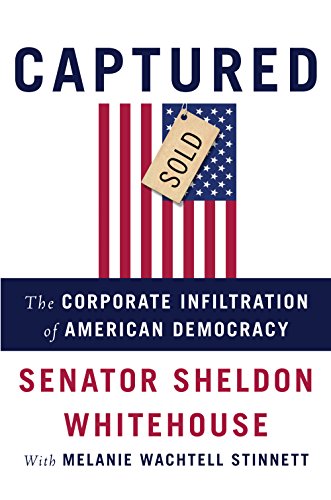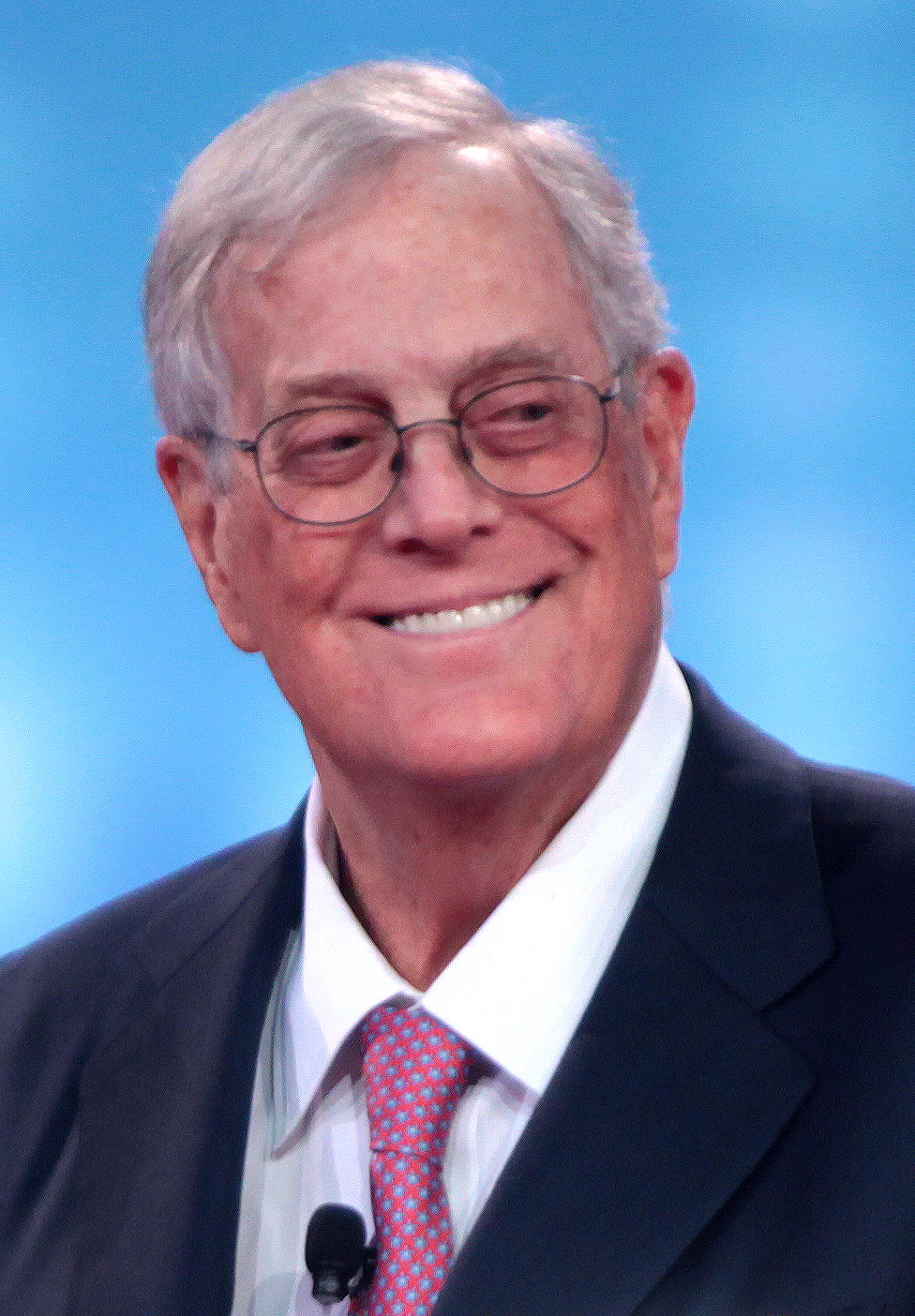Book Review: “CAPTURED: The Corporate Infiltration of American Democracy” by Sheldon Whitehouse (Author) and Melanie Wachtell Stinnett (Contributor) Published 21 February 2017, New Press, 272 pages
American democracy is in deep trouble, chained down by corporate power. This, in a nutshell, is the argument made by Senator Sheldon Whitehouse in his just published book, Captured: The Corporate Infiltration of American Democracy. He wrote the book, he says, in the hope of waking up his fellow American citizens to the risk they are running. To free themselves from the shackles of Big Business, they need to know exactly who they are fighting.
As I watched Trump give his “America First” inaugural speech, I knew something was deeply wrong with America. His speech signaled America’s abandonment of world leadership and rejection of globalization, a stunning paradigm shift. Since World War II, no American President had ever said anything like this. It chilled me and in fact, it sent a chill around the world among those who counted on America, particularly NATO countries, while it opened an unexpected door of opportunity for the competing powers of China and Russia. Would the 21st century belong to them? Suddenly, it looks like it.
How did we get here? This is the book that provides the key to understanding how we got there and why.
Yet Trump’s “alt right” form of populism, though it resonated deeply with some 60 million Americans, is still only part of the explanation. It throws light on why Trump is focused on job creation in industries devastated by globalization worked so well. That automation was as much a culprit as globalization is beside the point: His populist message rang loud and clear, echoing with the unemployed, disenfranchised men who are his fans, as were the related promises to kick out illegal immigrants, raise border taxes and build a wall that Mexico “will pay for”. But the rest of his agenda had deeper roots that linked elsewhere – with corporate lobbyists.
SEE RELATED ARTICLE: Trump Populism, a Threat to Democracy? Book Review: What is Populism by Jan Werner Muller
Tax breaks for the rich, abolition of Obamacare, systematic deregulation, the whole conservative mix spurred by climate change denial, have been standard Republican policy fare long before Trump arrived on the scene.
What all this adds up to is a take-over by corporate power of the three branches of government: Congress (legislative), the Supreme Court (judicial), and the Federal Government (executive) – a take-over that took decades in the making. Building on the extensive research done by Jane Mayer in Dark Money, Senator Sheldon Whitehouse describes how it happened, adding his own experience and insights, ably complemented by Melanie Wachtell Stinnet in the demanding historic research his book required.
Since it was largely written during the presidential campaign, the postscript, dated 17 November, is particularly enlightening. Whitehouse warns that, more than Trump, we should closely watch what Vice President Pence is doing.
Why? Because Trump’s agenda is not quite the same as Pence’s. Corporate power is behind Pence, not necessarily behind Trump – though this is a balancing act that may not last long.
In fact, by February, Whitehouse was telling the Boston Globe that although Donald Trump had been elected president without mega-donors or an effective Super PAC, this had not actually changed anything in the relationship between politicians and the corporate donor class. “Instead, what you are seeing are corporate tentacles just wrapping the White House,” he said. “I think he is going to continue to be more and more hemmed in by the very power structure he ran against.”
He may be right but that is clearly partisan talk from a Democrat. So why should we listen to what Senator Whitehouse has to say?
Who is the Author
Sheldon Whitehouse has represented the state of Rhode Island in the Senate since 2006, and was previously United States Attorney (1993 -1998) and Attorney General of Rhode Island (1999-2003). Born into a foreign service family, he was brought up in the many countries where his father was posted. A graduate of Yale University (1978) and Juris Doctor from the U. of Virginia Law School (1982), Whitehouse describes himself as a consumer advocate, reformer, prosecutor, and environmentalist.
In the Photo: Senator Sheldon Whitehouse (2008) Photo Credit: Kenneth C. Zirkel
Whitehouse’s fight for safer neighborhoods, stronger communities, and a more just and healthy world motivated him to write a first book, out in 2012: On Virtues: Quotations and Insight to Live a Full, Honorable, and Truly American Life, a collection of the quotations that “meant something” to him and that he had gathered “bit by bit” over 20 years in a “little-handwritten notebook”. In his words, that “something” had a “lot to do with America and what America stands for: our system of government and its balance and counterpoise; with our belief in principles over power; with our American sense of journey; with what we mean in the world.”
A very personal book, far from partisanship and political infighting, it shows you what kind of man he is, a true patriot, a man of conscience with the strongest sense of duty. And an optimist who doesn’t give up, as shown in this video celebrating the 100 weekly talks he has doggedly given on climate change:
Unsurprisingly, given the character and experience of its author, “Captured” is a well-researched, balanced book that provides convincing evidence pointing to a long-standing corporate conspiracy – a conspiracy in which the Koch brothers play a leading role, supported since 2010 by the Supreme Court’s Citizens United decision that unleashed a flood of untraceable money into the election process.
As Whitehouse underlines, the Supreme Court in this infamous decision refused to “distinguish between people and corporations”, giving “billionaire oligarchs a First Amendment stranglehold on the electoral process”. In short, “the five conservative justices create[d] a new political aristocracy with the stroke of a pen”, noting that there is “nothing in the Constitution [that] gives CEOs the right to amplify their voices over all of ours through the corporations they control.”
And he quotes Warren Buffet’s striking comment: “They say it’s free speech, but someone can speak 20 or 30 million times and my cleaning lady can’t speak at all.”
The worst part of the whole story is this: when money cannot be traced, corruption is inevitable. Political outcomes are shaped at the bidding of billionaires, they no longer reflect the votes of “normal” citizens. I am not one to believe in conspiracies, but in this case, it is difficult not to. This is no longer the America I knew back in the 1960’s when I was a student at Columbia University. No longer a working democracy, no longer “the light of the world”, the “city upon a hill”, and that makes me very sad. I am not an American, merely an outsider, a sympathetic European observer, but all of us looked up to America for the example it set, for the hope it gave.
This is a stunning turn of events and this book explains exactly how it happened. There is a brilliant deconstruction of the Citizens United decision, tracing all the decisions that led to it along with the unfailing conservative bias shown by Supreme Court Justices nominated by Republicans. Every time, unerringly, they voted 5-4 against the liberal judges.
How it Began
It all started with the famous 1971 confidential “Powell Memo” to the US Chamber of Commerce that laid out “possible avenues of action to aid American big business”. Among them, there was the suggestion to assemble a team of “highly competent” lawyers to file “amicus briefs in the Supreme Court”. The idea was to launch an “impact litigation” strategy, designed to counter the late 1960’s – early 1970’s surge of anti-business sentiment that had given rise to new regulations, including the establishment of major regulatory agencies for transport, consumer safety and the environment.
In The Photo: Official Portrait of US Supreme Court Justice Lewis Powell (1976) Photo Credit: Color negative by Robert S. Oakes (Library of Congress. [1]) [Public domain], via Wikimedia Commons
With “impact litigation”, the basic idea is not to defend a particular client but to change the law.
It took the Chamber of Commerce until 1998 to formalize the strategy through the creation of an Institute for Legal Reform (ILR) which openly describes itself as “national legal reform advocate…working to change the laws, [and] also changing the legal climate.” Note that in this video, ILR seeks to appear as a virtuous reformer battling against “excessive lawsuits” both in the US and abroad.
In this process of government destruction, the 1978 decision Powell delivered in the case of First National Bank of Boston v. Bellotti when he was Supreme Court Justice (he had been nominated by Nixon in 1972) was a landmark: it extended First Amendment protection to “corporate speech in political discourse” – meaning all barriers to corporate political engagement were removed, opening the way to Citizens United.
In the long chain of events that brought us to this point, I was most struck by one particular, almost bizarre fact reported by Whitehouse (and that I didn’t know about): in 1980, David Koch, one of the brothers, decided to run for the Vice-Presidency as a candidate for the Libertarian Party. He did not get elected but, as Whitehouse wryly notes, his “political platform of 35 years ago reveals volumes about the Koch brothers actual priorities”.
Here is David Koch’s platform (summarized). It’s an eye-opener, or as Whitehouse says, “buckle up, because it’s quite a ride”.
The Libertarian Koch candidate:
- Opposes
- all personal and corporate income taxation, including capital gains tax; as an interim measure “all criminal and civil sanctions against tax evasion should be terminated immediately”
- Federal campaign finance laws and “the immediate abolition of the despotic Federal Election Commission”
- all laws which “impede the ability of any person to find employment, such as minimum wage laws”
- Social Security system viewed as “fraudulent, virtually bankrupt and increasingly oppressive” and “all government welfare, relief projects and ‘aid to the poor’ programs”, including all subsidies “for child-bearing built into our present laws” and all welfare plans because the “proper source of help for such persons” should be voluntary
- Occupational Safety and Health Act and opposes all “so-called ‘consumer protection’ legislation, including laws requiring an individual to “buy or use so-called ‘self-protection’ equipment such as safety belts, air bags or crash helmets”;
- Calls for the privatization of:
- Education, i.e. the “complete separation of education and the State” and the end of “government ownership, operation, regulation and subsidy of schools and colleges”, condemning “compulsory education laws, which spawn prison-like schools”
- Water: “inland waterways and of the distribution system that brings water to industry, agriculture and households”
- Transportation: (1) a “return of America’s railroad system to private ownership and privatization of public roads and national highway system” (2) the postal system, “allowing free competition in all aspects of postal service”
- Calls for the abolition of:
- Medicare and Medicaid programs;
- Food and Drug Administration;
- Environmental Protection Agency;
- Department of Energy;
- Consumer Product Safety Commission;
- governmental Postal Service;
- All transportation agencies: Department of Transportation; Federal Aviation Administration; Civil Aeronautics Board; Federal Maritime Commission; Conrail and Amtrak
Wow.
In the Photo: David Koch Photo Credit: Gage Skidmore via Wikimedia Commons
That was Whitehouse’s reaction too: “Wow. This is obviously not the agenda of all corporate America, but it shows the antigovernment extremism of one of corporate America’s most politically active voices”. But it is worrisome to note the extent to which the Trump administration’s agenda eerily echoes it with regard to taxation, deregulation, the environment, in particular anything to do with climate change and education.
The Koch brothers learned from their electoral defeat, never again would any of them run a campaign. Instead, they decided to capture one of the two parties, the choice was easy, they slowly, over the next three decades, increased control over the Republicans. They and their billionaire friends.
What we have now is “a network of conservative mega-donors (led by the Koch brothers) that has created a shadow GOP.” (p.29) The New York Times reported that the “Koch network” had spent $400 million in 2015 (note: that’s for a “normal” year, before the presidential election cycle got really started). For 2016, the network announced it would spend $886 million, more than twice the amount of the Republican National Committee. A “staggering sum”, though it probably did not need to spend it all because, as Waterhouse pointed out, the mere threat of spending it is enough to keep many Republican politicians toeing the (conservative) line.
You could argue that this is less than a billion, and in an age where Silicon Valley features unicorn start-ups worth several billions, it may sound modest. But, according to Kenneth P. Vogel (in a Politico article), the Koch network now rivals the GOP, having built a “private political machine without precedent” employing 1,200 full time staffers year round in 107 offices across the country. Whitehouse concurs: They can field 2.7 million activists, with “platoons of employees in critical swing states, with voter database cross-linked to your consumer data, with advertising and media buying specialists, with an intelligence gathering operation staffed by former CIA operatives – and with no limits on what they can spend.” (Chapter 3)
In fact, the Koch network’s “voter data base” is scary: it currently covers some 250 million Americans. Talk of privacy!
We are far now from the 1970’s, a simpler, naïve time when corporate power was still modest: in 1971, only 175 firms had registered lobbyists in Washington. But the build-up was fast, a decade later, by 1982, nearly 2,500 did. Likewise, corporate PACs increased from under 300 in 1976 to 1,200 by the middle of 1980.
So, in front of the corporate bulldozer, how can we resist?
A Roadmap for Resistance
Arguably, this is a flaw in Whitehouse’s book: He doesn’t tell you what you should do, beyond exhorting you to stand up for your rights. But I suspect that is deliberate. He has put together the facts and has written a book that is largely bi-partisan, open to Republicans as much as to Democrats. It is in that spirit that he ends with a plea: “So please, let’s wake up and get off the couch. There are plenty of groups out there that want your participation. There are plenty of issues that need your voice…Find the ones that move you and engage.”
But, in the course of his promotional book tour, he departed from his neutrality and indicated “three planks” the Democrats would “need to run in the next elections”:
- disclosure of donations: that’s where his book “Captured” comes in, it points to “the glove with the Koch brothers hand in it, with Wall Street’s hand in it”;
- “a really, really strong and simplified economic message”: “Stuff that people can envision and we can deliver” The party must take a handful of issues and be exceptionally visible on them, he said, naming student-debt relief and a carbon tax as two such things.
- The party needs to be “solid” on its national security and defense platform“, for example, “getting ahead of the big liabilities like cybersecurity” The Party should not “get painted into a soft-on-safety corner” that would leave Republicans with a chance at a winning hand on this score.
While the last two “planks” are clearly directed to the Democratic party, it should be possible to have everyone across the political spectrum agreeing on the first plank, “disclosure of donations”.
As long as money cannot be traced, American democracy runs a very real risk of sinking into corporatocracy. Reclaiming democracy should be the order of the day: unchain America!
EDITOR’S NOTE: THE OPINIONS EXPRESSED HERE BY IMPAKTER. COM COLUMNISTS ARE THEIR OWN, NOT THOSE OF IMPAKTER. COM Feature Photo: G Bolduc/ Unsplash














